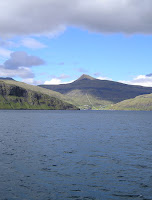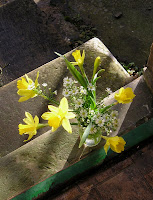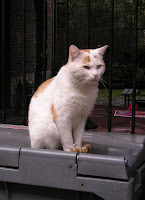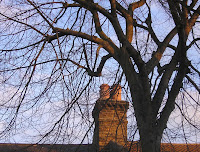
The last thing I did, whilst going down with appendicitis, was give a talk about Second Life, and the first thing I did when starting my return to work was give another one. I haven't yet put these in my own slideshare space, but there is a slidecast of one talk and a video of the other.
Firstly, slides (in some cases - including my own - with audio) are available from the one-day JISC-CETIS event
Maximising the effectiveness of virtual worlds in teaching and learning (held 16 Jan 2009) are now available on the event website at
http://wiki.cetis.ac.uk/CETIS-Eduserv-VW2009. My own talk was
Approaching learning and teaching in Second Life. In it I talked about the way in which approaches to teaching and learning (e.g. those approaches which have been identified in educational research) can be interpreted and observed in Second Life. I also talked a little about collaboration with others in SL. I gave a couple of examples related to information literacy (the first picture shows my model of the 7 Pillars of information literacy in Second Life). Other talks at the JISC-CETIS event included ones about Open University and Edinburgh University activities, and an overview of what British unis were doing in SL.

The earlier talk was given at the
Relive08 virtual worlds conference held on 20-21 November 2008. Although you will see that the image I used on the title slide (shown above) is the same for both presentations, the content was different . The webcast of this presentation,
Inquiry and information behaviour in Second Life, (video, including slides) is at
http://stadium.open.ac.uk/stadia/preview.php?whichevent=1248In this talk I explained what information behaviour (IB) was & why it mattered, described the activity that my students were carrying out to investigate IB in SL, and talked a bit about results from last year. Other videocasts on this page include some interesting panel discussions and a presentation of doctoral work - in which a non-information scientist is using faceted classification to categorise virtual worlds. You can find links to videocasts from the first day of Relive08 at
http://www.open.ac.uk/relive08/
 The US National Forum on Information Literacy is having a 20th Anniversary Celebration on October 15 and 16, 2009: Empowering Future Generations: Information Literacy in Washington, D.C., USA. On the 15 there is an Anniversary Dinner with a Keynote Address from Arthur J. Rothkopf, Senior Vice President, U.S. Chamber of Commerce. The 16th includes a Panel Discussion: Empowering Future Generations: Information Literacy – A National Strategic Plan. Questions to the conference co-chairs: Dr. Lana W. Jackman, lj@infolit.org (also teh contact for sponsorship offers) or Dr. Sharon A. Weiner, sw@infolit.org More details regarding the conference agenda, keynote speakers, registration etc. will be available at http://www.infolit.org/
The US National Forum on Information Literacy is having a 20th Anniversary Celebration on October 15 and 16, 2009: Empowering Future Generations: Information Literacy in Washington, D.C., USA. On the 15 there is an Anniversary Dinner with a Keynote Address from Arthur J. Rothkopf, Senior Vice President, U.S. Chamber of Commerce. The 16th includes a Panel Discussion: Empowering Future Generations: Information Literacy – A National Strategic Plan. Questions to the conference co-chairs: Dr. Lana W. Jackman, lj@infolit.org (also teh contact for sponsorship offers) or Dr. Sharon A. Weiner, sw@infolit.org More details regarding the conference agenda, keynote speakers, registration etc. will be available at http://www.infolit.org/
















